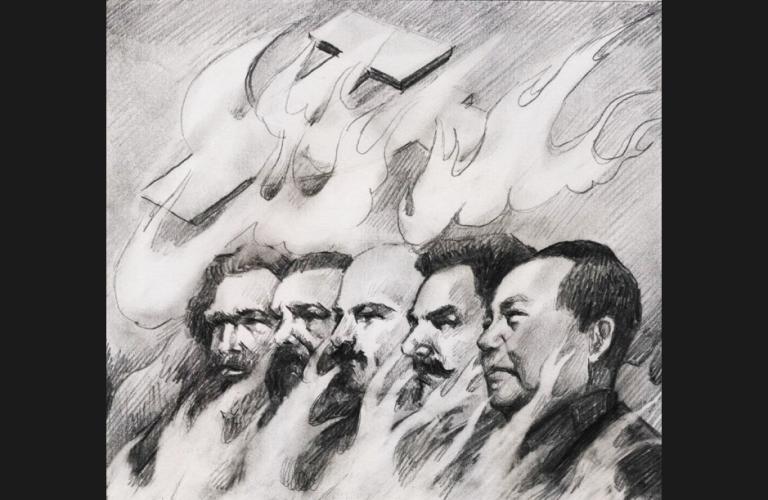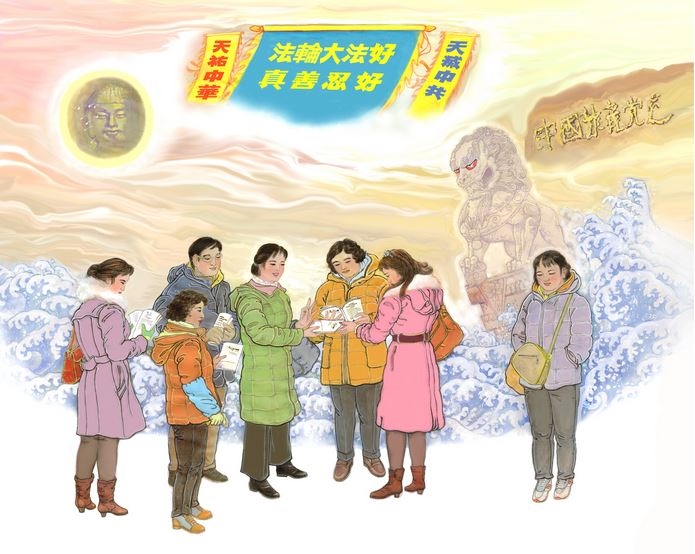First published in 2006 by the Chinese-language Epoch Times, this series lays out in detail the vast system of Communist Party culture that dominates mainland China today and how it violently replaced the ancient moral and spiritual heritage of the Chinese people. Vision Times is proud to present a translation of Disintegrating the Culture of the Chinese Communist Party that sheds light on the fundamental characteristics of the world’s biggest communist state, while keeping true to the message intended by the original authors.
Traditional Chinese Culture and Communist Party Culture (Part II)
Continued from Chapter One (Part I).
Dialectical materialism: the cornerstone of communist doctrine
Closely related to the communists’ fanatical promotion and enforcement of atheism is the theory of dialectical materialism. While atheism is simply to deny the existence of divinity, communism establishes a strict materialist outlook on nature and human existence. This worldview, inimical to traditional understandings of humanity and the universe, has been imposed upon the Chinese people through decades of indoctrination. The consequences of this materialist education are multifaceted and far-reaching, manifesting in society, politics, and even interpersonal relations.
The dialectical materialism of Marxism is different from the scientific method, which draws conclusions from repeatable and measurable experimentation. However, while science relies on a materialist conception of reality, it does not prescribe answers for the philosophical questions of human existence, such as those concerning ethics, morality, or the meaning of life.
Albert Einstein, upon reviewing the manuscript of Friederich Engels’ Dialectics of Nature, was unimpressed with the scientific merit of the work and did not recommend it be printed, telling Marxist publisher Edward Bernstein that the contents of the manuscript bore “no special interest” whether from the standpoint of modern physics or as a historically relevant study.
Success
You are now signed up for our newsletter
Success
Check your email to complete sign up
Indeed, the dialectical materialism espoused by Marx and Engels has nothing to do with natural science, but is a fallacious doctrine upon which all of communist ideology lies.
Traditional dialectics, such as the Daoist Taiji with its dual forces of yin and yang, understood the universe and humanity to be in a state of equilibrium. Lao Zi, the sage of Chinese Daoism, wrote in the Dao De Jing that chaos emerges when humanity has lost touch with the Dao or Way:
“The Dao is lost, and then virtue; Virtue is lost, and then benevolence; Benevolence is lost, and then righteousness; Righteousness is lost, and then etiquette; Those who have etiquette are a thin shell of loyalty and sincerity; And the beginning of chaos …”
Marx and Engels, however, saw this chaos as desirable for the purposes of revolution. In the “Communist Manifesto,” they wrote: “communism abolishes eternal truths, it abolishes all religion, and all morality.”
Dialectical materialism provides the mechanic for communist thought and action. It inverts the traditional conception of a cosmos regulated by divine principle in favor of a grim existence in which the strong prey upon the weak, and the powerful impose their socio-economic structures upon the powerless. Rejecting traditional morality, communism and its philosophical relations take violence and deception as the fundamental tools in their political and social campaigns, using any method available in the pursuit of the one and only goal: to seize and maintain power.
Power over truth
According to the dialectical-materialist conception of the world, humanity arrived at its current state through a progressive series of biological, social, and economic revolutions. For Marx, merely providing analysis of the world was not enough; philosophy can only affect change by taking a role in the violent and never-ending class struggle.
Thus, the communists fill the hearts of their followers with the greatest of ideals, promising equality, prosperity, and a veritable paradise on earth. Such ideals attracted many people to join them, resulting in the red curse spreading to a dozen countries, with hundreds of millions enslaved and 100 million dying from unnatural causes. It is difficult to maintain political power through the use of violence alone. The Communist Party uses lies not merely to rationalize its bloodshed, but also to guide and control all aspects of society, from the political, economic, military, and legal to the scientific, medical and health, education, and family. No corner of life remains untouched by the Party’s totalitarian grasp.
The materialism of Marxism has provided theoretical guidance to the communists’ philosophy of violence and struggle. The early expression of “materialism” in Communist Party culture was a cult of violence. Thus, according to Marx, “material force must be overthrown by material force”; according to Engels, “machine guns and cannons have the greatest persuasive power”; Mao had his famous slogan that “political power grows out of the barrel of a gun”; upon which Mao’s top general Lin Biao followed up: “political power is the power to persecute. Once we have power, millionaires and billionaires can be overthrown overnight.”
Today, the Chinese Communist Party (CCP) has not abandoned this materialistic outlook. Communist Party culture in fact pervades Chinese society to a degree not seen in the past, with people seeking nothing but profit and placing material benefit above all else.
The communists do not understand the power of faith, but worship the power of violence and money. The Party’s confidence in the power of oppression also comes from its belief in materialism.
Materialists deny the role of ethics; seeing all principles as those arbitrarily created by man to rule man. It takes morality as belonging to a certain social class; in China, the Communist Party is naturally the sole authority to define and describe morality. The CCP has altered its superficial laws and principles countless times over decades of struggles and campaigns; there is no room in its regime for unchanging standards of what is honorable, just, or virtuous.
“How much for a pound of morality?” Such is the typical thinking of a person brought up under the materialist culture of the Communist Party.
For the Communist Party, the denial of moral values naturally extends to a disregard for human life. Engels held that life is but the arrangement of proteins, and that death is merely a change of state from one form of matter to another. This callous attitude explains how communist regimes around the world committed mass murder and torture against millions of innocent people, including their own supporters, on the flimsiest of political justifications.
Materialism directly denies the role of conscience. One with faith in God or the divine will feel guilty if committing bad deeds, and fears divine witness or retribution. An atheist indoctrinated in the Party’s materialistic creed can do evil without any scruples.
As Mao Zedong said: “A thorough materialist fears nothing.” If there is no God, the only way to punish people in this human world is violence; in particular when a person or organization is itself the sole arbiter of violence, then what evil will it be afraid of?
The more important issue is that under such a worldview, responsibility for the judgement of good and evil rests not with divine or heavenly will, but in the sole hands of a secular power. Good and evil are merely what the powers that be determine them to be for the ever-changing needs of their continued grip on power.
The CCP claims that “material defines consciousness,” that “the economic base determines the superstructure.” It is economic development that leads to political civilization, and economic development that will lead to a moral and prosperous system of law and democracy.
But in the generations since the Party seized power, its materialist doctrine has produced just the opposite: political corruption, dictatorship, bloody purges and mass murder, nationwide famine, the destruction of ancient culture, disregard for the law, a widening gap between rich and poor, and steep moral decline. Modern Chinese society is awash with fraud, infidelity, betrayal, and lies.












